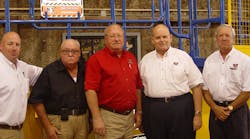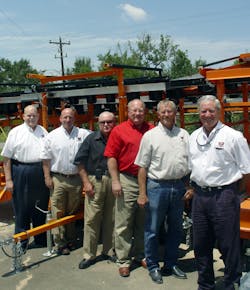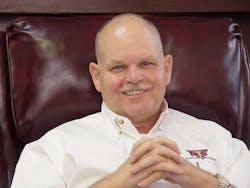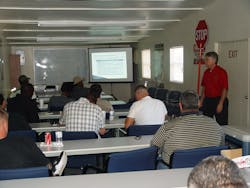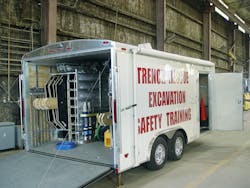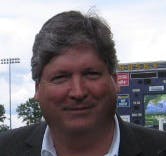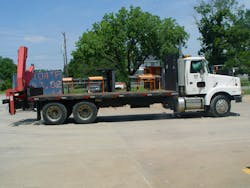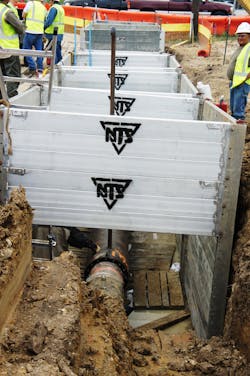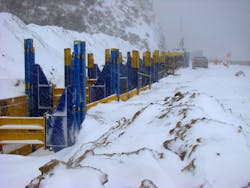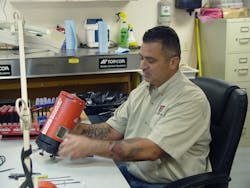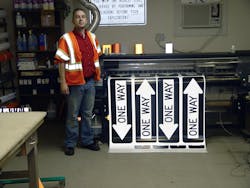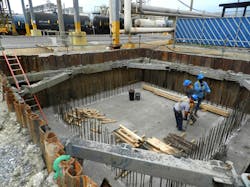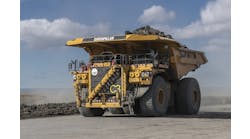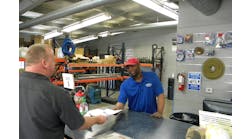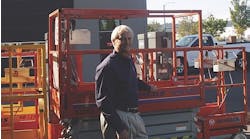National Trench Safety focuses on Safety in the Trenches
“We look down and see a guy in a hard hat in a small trench and a guy in a backhoe right next to him right by the side of the road,” Bangerter says. “‘You could die,’ Ron shouts, ‘please get out of the hole.’ After a discussion the operator said they had no money in the job for shoring. Ron said, ‘I will send you free shoring, just get out of that trench.’ That’s the kind of person he is. We could have just driven by, but no! We stop and he tries to educate him and then sure enough, he gets on the phone and calls our branch guys and says ‘Get some equipment out here, this cannot happen.’”
Chilton, NTS’ CEO, sees the importance of educating the market. “Our biggest competitor is ignorance,” he says, estimating he makes spontaneous roadside stops a couple of times a month. “I travel a lot around the country and if I see somebody working at or near the side of the road, I just pull over and start talking to them. If need be, I will get somebody out there and I will give them some information. Sometimes they get mad and say ‘We didn’t call you, we didn’t ask for your information.’ I say ‘I understand that but you’re going to be calling somebody here pretty quick.’ Because usually an OSHA guy will be here or an ambulance will be here if you don’t get some shoring in that trench.”
NTS Gulf Coast district manager Gary Martin says there is a trench cave-in at least once a month just in the Houston area alone, and that far too many of them involve serious injuries or fatalities.
“It’s quite common,” Martin says. “Even though the OSHA standards are what they are, you still have contractors that will try to cheat and get by without the proper protection. And in this area of the state, if you dig down six feet, you’re going to hit water because of the saturation of the ground. It’s a big problem.”
“We don’t want anybody to die,” says Bangerter. “It’s not about tattling, it’s about saving a life. We’re a safety company.”
Safety training is an ingrained part of the daily operations of NTS, a rental company that has the word safety in its name. From the daily training and trench safety education classes NTS offers at most of its branches, to the training it offers on the jobsite, the company emphasizes trench safety companywide on a 24/7 basis.
A couple of nights before a recent Christmas, in the middle of NTS’ Christmas party, one of the staff received a call about a trench cave-in in Richmond, Texas, a small city outside of Houston. Many of the staff, including Chilton, dropped what they were doing, mobilized the trench-rescue van, and headed out to support the fire department and rescue the trapped workers.
“It’s education, that’s why we spend so much time training,” says Chilton. “We’ve got three full-time trainers and two part-time trainers. We do OSHA Competent Person and Confined Space training, 10-hour programs, 30-hour programs; we do training in English and Spanish, trench rescue training, lockout tag-out training, crane training, forklift training, CPR training, flagger training and first-aid training. We do a lot of classes.”
The emphasis on training extends to the jobsite as well. “Our guys put in a lot of time on the excavation, fitting the correct product to the job, showing them how to install, making recommendations, working with our engineers and figuring out what things will work or won’t work for their particular application,” says Chilton.
NTS’ commitment to safety and training has led to ground-breaking innovations. One is the trench-rescue trailer, fitted inside with shelves and racks and equipped with everything needed for a rescue operation.
“We do trench-rescue training for different fire departments and municipalities,” says Martin. “We actually go out in the field, we dig a trench, and we do scenarios where there’s a cave-in. We put a dummy down there as a victim and we actually go in there and teach people the proper way to do a trench rescue.”
Another NTS invention is its work zone safety system, an integrated, fully engineered solution to protect workers and the public in and around an excavation. The NTS Work Zone Safety System includes a modular fall protection hand-rail system, a ladder access and exit system, and a complete fall arrest and recovery davit arm device for workers in and around an excavation. [The product was the co-winner of RER’s 2012 Innovative Product Award — see December 2012 RER for more information.]
Bangerter tells another story that dates back to the very launch of the company.
“We were meeting at my house during our first couple of days forming this company, and Tom Hartman and Wes Jones [NTS co-founders] got to the house before Ron did that morning and I had a pipe burst in the front yard. The city was there, they dug a hole, and a guy got in it. We look outside the window and there’s a guy in the hole. Tom went out of the house and said ‘Uh uh, get out of that hole.’ And the guy says ‘We’re only going to be in it for a minute.’ We started the educational process that day. Tom said, ‘You don’t understand, this is all disturbed soil, it’s likely to cave.’ We really do take safety seriously.”
The Extra Mile
Safety begins by ensuring that the job is being done the right way. NTS has its own in-house engineering department and customers often rely on NTS for expertise in helping them to design the best possible approach to a trench-shoring solution. Leading the way is Robert Stevenson, national manager of engineered products. A founding member of the company, Stevenson is literally prepared to fly out at a moment’s notice to review a job so he, along with his engineering staff, can design a solution.
Stevenson oversees the specialized larger projects that involve project-specific engineering. He oversees the plans designed by NTS’ in-house engineering staff, making sure they integrate with the contractor. “We feel like we can engineer anything to meet a customer’s needs,” he says. “However, when it comes to the practicality as far as how it translates to the contractor, we make sure they understand how what we’re providing is going to work for the contractor.”
Stevenson also oversees the quoting process for many large projects that require unique situations.
“A lot of times in those larger projects, larger scale jobs, we’ve got to have many meetings prior to actually sending the equipment,” says Stevenson. “We want to make sure that the contractor — from the owner, project manager, estimator — is aware of the scope of the work and how the installation process of the shoring system works. So we’ll have local meetings face to face to make sure everybody is on the same page. When we send the equipment, we send a NTS-certified installer to work with the contractor, making sure that our stuff goes to work properly according to the plan, and number two, that they don’t beat the hell out of the equipment.”
Some of the projects are complex and pose a variety of challenges, such as having to look out for adjacent structures, buildings, roads or railroad tracks. “I’m working on one now where we’re about 17, 18 feet from a single-line railroad track and we’ve got to go down 28 feet to do a repair,” Stevenson says. “So I’m working with the pipe line company and the contractor to figure out the best way possible because it’s out of the ordinary. It’s not just digging up the earth and setting in a trench box. We need a site-specific system whether it’s our slide-rail system or a beam-plate system or tight sheeting, where we drive the sheets in with a vibratory hammer. It just depends on what’s feasible and correct for the specific application.”
Stevenson travels all over the United States, Canada and Mexico to analyze jobs. Sometimes emergency situations arise and he goes on immediate notice.
“There have been cases when I needed to go over to the mall and buy some clothes, I didn’t even have time to go home and pack,” he says. “But this is what we do taking care of the customer. It’s not just working with the typical shoring company. We’re building up a partnership, a relationship with that project. That’s what goes along with it, taking that extra mile and being responsive, and beyond. It goes a long way.”
While many contractors are experienced in installing shoring, sometimes the solutions are more complex and challenging than what they’re accustomed to.
“We send out the certified guys to make sure the contractor understands the installation procedures and everything starts out right,” says Stevenson. “What we pride ourselves in is having the knowledge and expertise to be able to handle the big deep nasty jobs as we like to call them and being able to have guys onsite to work with the contractor so they understand how it works. The last thing we want to do is send something out and not be there when the contractor doesn’t know how to put it together or beat it all up and we have to charge them for damages. We don’t want to have to do that.”
Hometown Feel
NTS — which also does a significant traffic-control business, renting and selling electronic message boards, arrow boards and other traffic-control equipment — has only been in existence since 2004 but its breadth of experience recalls much older companies. In fact, most of the key people have been together two decades or more. They started working at The Plank Co., which was acquired by NES in the late 1990s. NES later sold its trench safety division to United Rentals. Many have been together for 20 to 25 years, from CEO Chilton and the other founders, to others in management, sales and other capacities.
“We all basically come out of the Plank Company,” says Chilton. “At one time 92 percent of the employees of NTS had been together at least 18 years. At Plank, then NES, United and then here. I don’t know exactly what the percentage is today, but I’d still say it’s over 75 percent.”
“We have a really strong team,” adds Martin. “And what makes NTS so successful is that we’ve been together so long. I can look at a guy and I know what he’s thinking.”
Ron Chilton got his start in business after getting out of the Marine Corps during the Vietnam War. Chilton went to work as a corporate pilot. One of the executives he flew around recognized Chilton’s drive and began mentoring him about business. Chilton went on to work for several large “Fortune 100” companies, and ended up with the Plank Co., a trench-shoring specialist. Chilton eventually became chief operating officer for Plank. When owner Mike Plank sold his company to NES, Chilton went along and headed up NES’ trench-shoring business as well as other parts of the company as a regional manager and president of the trench group. NES later sold its trench-shoring division to United Rentals. Not having a non-compete agreement and not wanting to be a part of United Rentals, Chilton went his own way.
When many of the NTS team members’ non-compete agreements with United Rentals expired, Chilton was eager to get back into the trench-shoring and traffic-safety business, believing there was still a place in the market for a company that was singularly dedicated to safety and customer service. He got together with partners Bangerter; Wes Jones, now senior vice president of branch operations; and Tom Hartman, vice president and western district manager, and together they founded NTS along with Martin, Stevenson and six other co-founders.
“We have virtually no turnover at NTS,” Chilton says. “We’re very disciplined. You’re not going to get hired here on one interview. You’re not going to get hired here on two, probably not three or four. You’re going to visit some folks before you get hired. And every time we break that rule, we make a mistake.
“If you treat your people right, if you listen to them, you respect them and they feel like they have a voice and they can be heard, most people don’t want to go somewhere else. It’s not always money.”
The teamwork and familiarity between the people at NTS contributes to its customer service ethic.
“We want to be a national player but with a hometown feel,” adds Bangerter. “We’re in the market to serve the customer and we’re not just going after the big guys or the small guys, we want to serve everybody.”
The Three Chilton Rules
The lengthy process Chilton describes when it comes to hiring people is part of Chilton’s essential three rules of business. The first one is “hire slow and fire fast.” The lengthy, in-depth hiring process Chilton describes is part of that theory. If you hire the right person, you will have longevity, as clearly NTS does, and you’ll rarely have to fire anyone. But on the rare occasions NTS makes a mistake in hiring, “fire them fast,” he says.
“If you know you have a mistake and you usually know that right away, my rule is sit down with them immediately,” Chilton says. “‘This didn’t work, I made a mistake, you made a mistake, it’s just not going to work, so let’s move on and make a transition so you can find something to do too.’ So make it quick.”
The second Chilton rule is, as a company, never be on the defensive, always be on the offensive. Always act aggressively; never be content to just sit back. “When I hear someone say ‘We’re just going to hunker down and operate this year, we’re just going to watch the market and see, we’re just going to lay back this year and keep our powder dry,’ that tells me they’ve given up on the business for the year, they’re just going to watch what happens. I like to be the guy making things happen, not watching what happens.”
Chilton’s third standing rule is if it doesn’t make money, don’t do it.
“So many times you hear people say, ‘We don’t make any money on this, but it’s a great support for our other business and if we do this, then we get that other business.’ That is the silliest thing I have ever heard. In addition, guys call me and say ‘Ron, we’re not going to make any money on this order but the next two we’re going to make a ton of money.’ My standard reply is ‘Good, let the competition have this one, I’ll take the next two.’ ”
Time to Collect
Like any rental company, NTS sometimes faces the problem of customers not paying, a common problem during the recent recession whose effects still linger for a lot of hard-hit contractors. It’s a balance many rental companies face: Keeping the customer service going when the customer doesn’t pay. NTS does what it needs to do to protect its rights, and like any company utilizes the legal means at its disposal when necessary. However, NTS also goes out of its way to try to help customers find solutions that would enable them to more easily pay.
“Our write-offs are very few and far between because our credit department is really monitoring and watching,” says Bangerter. “I may call the [customer’s] CFO if I have a problem. There are times when it might escalate to Ron and he goes one on one with them. He has no problem picking up the phone; he’s a very personable person. He might try to get them different financing or introduce them to private equity people who might be able to help them. There are customers that our guys have worked with for 30 years. Nobody likes to see another person struggle, especially during those times. We sustained through the downturn with very little loss of revenues. So it makes us proud because we know our customers really do appreciate us. They keep coming back.”
Growth Mode
NTS, while not aiming to be the biggest or expecting to be, nonetheless is in a growth mode, but it’s never growth for its own sake. Now at 17 locations — with another opening in Chicago — new branches primarily come about through greenfield start-ups as opposed to acquisitions, although the company recently acquired a two-location company in Florida that was run by two men who had worked with the NTS clan when they were all at Plank and NES.
NTS doesn’t go into a market because it necessarily chooses to be there, but rather in response to customers’ needs.
“We’re not trying to drive to 50 locations or have a certain level of revenue,” says Chilton. “Our intent is to be where our customers need us to be. Some markets we probably won’t be in. Either they are over-served by too much competition, or there’s not enough to justify us being there. We want to be able to service our national contracts and we want to be the alternative. We go when the customer says, ‘If you come, we can do something.’ We need a foundation to open a branch. We don’t just open a branch and say ‘Hello, here we are.’”
In a recent branch opening in Southern California, NTS will serve the traffic safety market, but not the trench shoring market because one of its major suppliers of traffic-safety equipment asked it to come to fill a void in the traffic safety area. However because the region is already well served by trench-shoring companies, Chilton says, NTS does not plan to rent trench-shoring equipment in this area.
“It doesn’t help us just to have a branch somewhere and be in business just to say we’re in business,” says Jones. “It’s how we can be a better company as we grow. We’re fairly slow and methodical with our branch openings. Over the years we’ve had people say they’d like the opportunities to go in and do quite a number of acquisitions or open up green-start branches in a lot of places, but we said a long time ago, that’s just not our mode. We’ll open some here or there as an opportunity comes along.”
Typically the possibility of an expansion move will involve a lot of discussion and analysis among founding partners Chilton, Jones, Hartman and Bangerter and other key figures as well as input from others in the company who might be familiar with the opportunities in a certain area.
No Engines
NTS is a specialty company. As Chilton says, the company rents “no machines with engines.”
“We’re not good at repairing backhoes,” says Chilton. “We’re not good at fixing flat tires, and we’re not good at repairing a leaking hydraulic line. NTS is not set up with service guys that can go out there at 10 o’clock at night because the fuel pump is broken down. We don’t have that infrastructure. But when a guy calls at 10 o’clock at night [with a trench-shoring issue] I know we have what he needs.”
“We’re a very narrowly focused business,” adds Jones. “What makes us different is we keep our discipline that if it’s in the hole, around the hole, or over the hole, that’s what we do. So if you’re working inside the excavation, around the excavation or over the excavation, we have some expertise. That’s how we built our distribution model, our warehousing model, our delivery model, our in-house engineering. We want to control our vertical integration.”
Chilton explains further. “Our thing is not price; it’s differentiation,” he says. “We show the technical ability we bring and the expertise we bring. Very few if any of our competitors have engineering departments like we do. Very few if any have the repair facilities that we do. Very few if any do the training we do. Very few if any have the amount of expertise and the old heads we have. That’s our differentiation.”
NTS has some additional specialties to enhance its offerings, such as a laser-repair shop that can rebuild a laser from scratch and do all the calibrations. People send lasers — sewer, pipe and rotating lasers and every other kind used in construction — from all the major brands from all over the country and the laser shop repairs them and gets them back to the customer within 72 hours, unless a special part is required.
NTS also has its own sign shops located across the country. The shops build signs used for its traffic-safety rental. The sign shops also make signs for other companies, municipalities and any other type of agency or business.
“We print on any sort of reflective material,” says Houston sign shop manager Zach Goodale. “We do municipal signs, construction signs, company logos; companies that are starting out a lot of times want you to help with their logos, so we do a little bit of that. We do a lot with home builders, different cities. Whoever walks through the door, if they want a sign any way they want it, we can make it to their specifications.”
NTS has sign shops in Houston; Las Vegas; Fremont and Anaheim, Calif.; Dallas, Phoenix and soon will have one in the Carolinas. The shops are all networked together so that one can design a sign in one branch and print it in another. NTS ships the signs to other locations that don’t have shops.
Passion for the Business
NTS owes its success to many of these and other factors, not the least of which is its strict budgetary discipline and tight communication among managers and other employees. Jones especially keeps a close watch on coordinating all aspects of operations.
“We kind of need to catch up with ourselves and improve our quality and make sure we’re not making too many repetitive mistakes,” he says. “My role is to give the branches some direction when they need it. We’ve got a lot of experienced branch managers out there, but still, everybody needs a bit of coordination. How to do things the same way, get on the same page. I work closely with the district managers and then back to the branches.”
While much involved with internal organization, there is nothing Jones enjoys more than interacting with customers. What makes him — and Chilton and, evidently the whole NTS staff — tick is a great passion for the business.
“One of the unique things that we have is such good people, the passion that our people have and there are cases all across the board,” says Jones.
It’s an assessment Chilton and just about everybody at NTS seems to agree with. And a lot of customers do as well. rer
